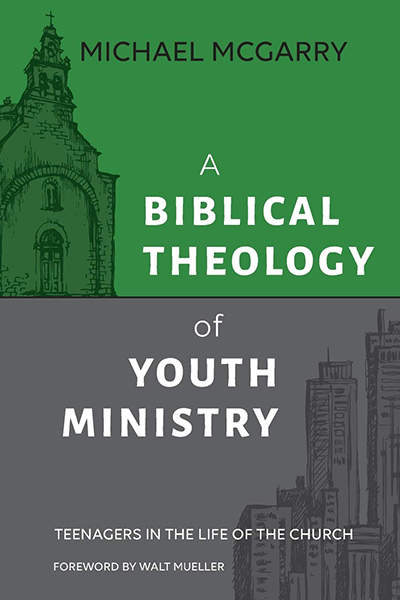Book Review: A Biblical Theology of Youth Ministry: Teenagers in the Life of the Church

A Biblical Theology of Youth Ministry: Teenagers in the Life of the Church by Michael McGarry. Randall House. Nashville, 2019. Total pages: 164 pages.
A Biblical Theology of Youth Ministry grapples with the challenge of pursuing a ministry to teenagers that is not just pragmatically enticing, but also grounded in biblical truth with a gospel focus. We are not to merely espouse biblical truths at youth gatherings, rather, we are to minister in the ways that support discipleship at home.
By the time Michael McGarry wrote this book, he had served in youth ministry for almost a decade and a half. He’s married with two kids and has a DMin from Gordon-Conwell Theological Seminary and thus is an in-the-know partner to share and guide a youth ministry professional’s journey.
“Youth ministry is for adolescence, the family is for life, but the Church is for eternity. May youth workers lead and serve accordingly.” This describes the big idea of the book and is what McGarry supported from biblical and historical research with practical recommendations on how to pivot from what we are doing currently—typically treating youth ministry as an end in and of itself—to a more biblical message and methodology.
McGarry pointed out three critical issues youth ministry must face. First, the high dropout rate as teens leave church. Second, the secularizing of youth culture and culture at large. And third, the fragmentation of church, youth ministry, and family.
Perhaps surprisingly, while 9 out of 10 parents understand that they have the primary responsibility for their kid’s spirituality, most don’t spend any time discussing or studying spiritual things together. Instead, they keep their children busy and inadvertently prioritize grades, sports, and other activities over Jesus, and then try to squeeze a little Jesus in when scheduling allows. This is backwards and must be changed.
According to McGarry the Bible doesn’t support a segregated, side show, church-within-a-church youth ministry but promotes efforts for the community to come alongside parents to help them disciple their kids. Young people shouldn’t be dropped off at youth group with the expectation that they will be fixed or discipled for the parents. Parents are the primary ones to disciple their own children, with the church’s role to reinforce the Bible training that happens at home. Youth ministry serves as a bridge between the home and the church family, and should help young people get involved in the larger church in which they typically don’t feel very important. The larger church should be intentionally intergenerational where the young disciples are not considered junior disciples but full-fledged disciples worthy of investing in and involving in ministry efforts right now. Would your church members be surprised to realize Jesus and his disciples were younger than most would want their senior pastor to be?
Parents must be discipled in order to disciple their children. Youth ministry connects the family to the church and helps both understand the culture around us that is becoming less and less Christian, treating the church as an entity on the fringe of society. Engaging all ages in evangelism is crucial at this juncture, and it starts at home since children typically reflect their parents’ faith. The larger church community can support this, which becomes even more crucial for young people who don’t have parents with exemplary faith.
McGarry called for solid exegetical, gospel-centered preaching because the gospel isn’t just for new converts but throughout life. It must be preached side by side with the law and with calls for repentance, confession, and transformation through Christ. When preachers fail to do this, they easily fall into preaching behavior modification—which doesn’t save or help anybody. Another tip for preachers: avoid religious language as much as possible so we don’t lose those who don’t understand it.
McGarry’s goal of youth ministry is to cultivate adult disciples who got rooted in Christ and the church when they were teens. This calls for relational connections now between church adults and teens, otherwise they can be uprooted and lost. McGarry called for the church to view young people as “our kids”—the church family’s kids—rather than “my kids”—the youth pastor’s kids. This requires the church to be invested relationally. While young people are in youth ministry there should be family events that help them see a different side of their own family rather than hosting events for teens only which separates them from the community. Include rites of passage out of youth ministry when young people finish high school. McGarry shared some measurements for success and steps to get there. He encouraged readers to start small and to include parents in the structure of youth ministry.
He challenged youth leaders to prioritize parents and to potentially spend more time with them than with the teens themselves since parents are the best people for discipling the youth. At the same time, the church at large should plan worship services and other activities intentionally with the children and teens in mind. Instead of being “multigenerational” with different ministries for different age groups, churches would do better to be “intergenerational” by integrating all ages in the church’s ministries.
The summaries and repetition of certain ideas throughout the book were helpful as McGarry supported them from different angles. The research, particularly on the history of the church and how we can better minister for more lasting discipleship were eye-opening. McGarry’s contribution could change the way we do ministry for the better with compelling theology and greater support for young people. He recommended some great resources, like Growing Young, Orange, and the D6 Conference, with their great tools such as curriculum and helpful ideas for application. The author’s writing style was a bit bland, but what do you expect from an academic book, and it’s certainly not insurmountable at 164 pages.
The picture of youth ministry as a bridge between the family and the church as a whole can be quite useful, especially for youth ministers who easily feel competition or even animosity toward parents who don’t get on board with the youth pastor’s plans. This book points out an often neglected field of ministry for youth work with and through the parents, and may help the pastor find friends and allies rather than foes in the adults. I know I am excited by the message of A Biblical Theology of Youth Ministry and have been sharing my findings in it with my leaders and hope that it will transform the service I offer my church for the years to come.
 |
Nick Snell is the pastor for youth, young adults and children at the Chapel Oaks SDA Church in Shawnee, Kansas. He is married with three kiddos and loves being active, learning, sharing and growing in hopes of being a greater influence for good in the world. |
